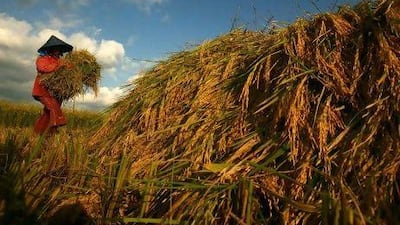Oxfam, one of the loudest voices in world famine relief, has called for limits on food commodities speculation and the dismantling of support for grain-based biofuels in an alarming report on world hunger.
The report claims the global food system is "broken".
Only radical action by the Group of 20 developed and emerging economies can prevent a doubling of basic food prices and mass starvation within the next two decades, Oxfam says.
The charity's warnings are just the latest in a long line of dire predictions that basic nourishment is becoming so expensive it is beyond the reach of many of the world's poor.
In April, the World Bank pointed out that global food prices were 36 per cent higher than they were a year ago, pushing 44 million more people below the extreme poverty line of having to live on US$1.25 (Dh4.60) a day or less - a total the bank now estimates at 1.2 billion.
And a year ago, the World Development Group, a charity aiming to reduce poverty, urged governments to introduce greater regulation of the food market to stabilise prices, blaming bankers for pouring money into commodities such as wheat and maize after abandoning the failed mortgage market during the global financial crisis.
Oxfam's latest report takes a different approach, blaming food price rises on a combination of factors including climate change, oil price rises, the depletion of natural resources and the scramble for land and water.
It also singles out for criticism the US and the EU for promoting biofuels as part of a policy that results in "15 per cent of the world's maize being used to make fuel, even at times of severe food crisis".
The report, Growing a Better Future, adds: "The amount of grain required to fill the petrol tank of a 4x4 vehicle with biofuel is sufficient to feed one person for a year. Meanwhile, EU targets in practice mean that 10 per cent of transport fuel will be biofuels by 2020."
Oxfam's emphasis on the importance of small farmers in tackling hunger was challenged yesterday by Nicola Horlick, a leading British investment fund manager who has invested in farmland in Brazil. "You cannot rely on a whole lot of smallholders to feed the world - it's not going to work," she told the BBC.
"It is really important in my view that we have more investment going into farmland. There are huge tracts of farmland that aren't being farmed."
Oxfam says now is the time "the major powers, the old and the new, must co-operate, not compete, to share resources, build resilience and tackle climate change".
The first opportunity they will have to do that is at the UN climate summit in Durban, South Africa, in December, when Oxfam says world leaders should launch a global climate fund, "so that people can protect themselves from the impacts of climate change and are better equipped to grow the food they need".
With memories still fresh of the disarray at the UN Climate Change Conference in Copenhagen 18 months ago, the sceptics have reason to doubt any such initiative will be forthcoming.

